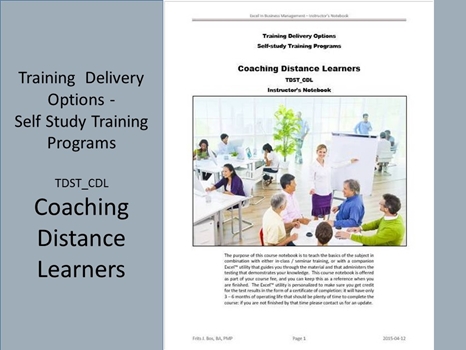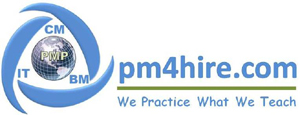
Coaching Distance Learners TDST_CDL
Distance learning is not easy for many people – what they require is contact with someone who can help them through the learning materials. Coaches are our representatives in areas where we do not have a formal presence, which can inhibit opportunities for study in those areas when no other training providers exist. Because distance learning without the support of a group can be a major challenge, the objective is to at least provide an option for qualified individuals to get engaged in ways to deliver training where it is needed. In this course we explore options for a model in which training facilitators can coordinate the delivery of training programs in their local areas of operation, and how that works with our other training delivery programs.
The objective of this program is to empower people in a community to help members of their community gain access to learning that otherwise is not offered within reach. Our program has a formal mechanism for managing students to make sure coaches get paid for working with those students: we can show you how to establish your coaching program and interact with our site to control enquiries and registration, as well as other aspects of student management. We suggest a formal program for coaches to register individuals, and for coaches to remit a reduced payment for sending student-specific learning materials needed by the individuals that are registered.
We recognize coaching as a business opportunity – you can even combine this with life coaching and/or career coaching to help individuals reach beyond a perceived glass ceiling to achieve new goals and objectives without giving up what work they currently do. Apart from a pre-defined code of conduct and business ethics, your motivation and focus on helping people in your quest to benefit your community will dictate how much you charge for your services in order to make a living. We have certain models that work for different people that we share with you as part of this education program.
Coaching Skills are based on your familiarity with the subject matter in the existing presentation, so that you can interact with students to show what and where information is available. For the most part this depends on the use of our distance learning materials (see TDST_OSP and TDST_DEP) and a setting where you either work with individuals one-on-one, or in a small group, as you show the material to facilitate learning. The notion of being a coach removes the expectation that you are a subject matter expert, so you can concentrate on what the training materials state, rather than on a knowledge base to supplement the training materials.
This session explores what options you may have to use your knowledge and perhaps establish a subset training program based on the skills and expertise you bring to the table. The opportunity to
Teaching Skills are based on your mastery of the subject matter, and how you explain and/or share knowledge that helps students to grasp what the material is about. use the knowledge you have does not alter the basic coaching arrangement, but it does change the value add you can provide prospective students. We are open to having the materials we provide used as the basis for a classroom style presentation provided that prospective teachers demonstrate their skills and qualifications to act in that capacity.
Mentoring Skills are based on your life experience and practical application of knowledge that you can contribute to help students understand how a bundle of knowledge is used in a workplace. Mentoring can be explained as “story telling” that helps students gain context for the subject matter in question, so they can better understand the application of the knowledge. Mentoring and coaching are related, except that the mentor is a veteran of the practical use of the knowledge, whereas the coach is focused on how the student learns the materials verbatim: one person can perform these roles in tandem, and mentoring can also be combined with teaching for an even more powerful presentation of knowledge.
One of the core activities is marketing the services you have to offer and, in tandem, the training programs that are available. This is how you create opportunities to make money on delivering training in areas where there are no immediate traditional opportunities available, and it is an excellent way to serve a community where people may be disadvantaged by a lack of traditional training facilities like community college or vocational college programs. In this segment we will explore how you can establish training opportunities that accommodate the latent needs in your community.
The bottom-line is that coaching distance learners can be an opportunity to add to your business portfolio. When people register through a coach, a process we explain in this session, it is the coach who then establishes the student in our training system and all training delivery will be coordinated through the coach. As a coach you can tap into our website to advertise a rich training curriculum, yet all contact details are managed through you as the intermediary, which gives you an “instant” program to offer students, as well as potentially to companies in your area that want to offer in-house training for their employees. As a coach you can even arrange to have the appropriate teachers come to your area to deliver the program.
Learning Formats TDST_CDL
This course is currently available in a classroom setting (public or company private) with approximately 15 contact hours, as well as in an on-line or distance learning format with approximately 15 contact hours.
PDF – Certificate Of Completion
Each course offers a certificate of completion that identifies the course, the student, and a brief description of the course. To receive a certificate the student must have attended at least 80% of the course sessions. This personalized certificate is forwarded to the student by Email. Part of this course is an opportunity to contract for delivering coaching services as an extension of our regular training programs.
PDF – Course Notebook
Each course includes a notebook in PDF format that provides the minimum knowledge the student must master in order to obtain the certificate. In the notebook you will find references to other study materials. Students receive the notebook by Email when their registration is confirmed.
PDF – Program Overview
An overview of this study program can be downloaded from the website by right-clicking on the program link on the enquiry page.
PDF – Current Training Schedule
A list of upcoming training sessions can be downloaded from the website by right-clicking on the schedule link on the enquiry page.
Registration – Service Providers
To register for any training course please look on the enquiry link page of your service provider (from where you accessed this website). On the page you will find a registration request form where you can order the course that you are interested in. The availability dates will be provided to you, along with payment instructions if you decide to go ahead.

 |
|